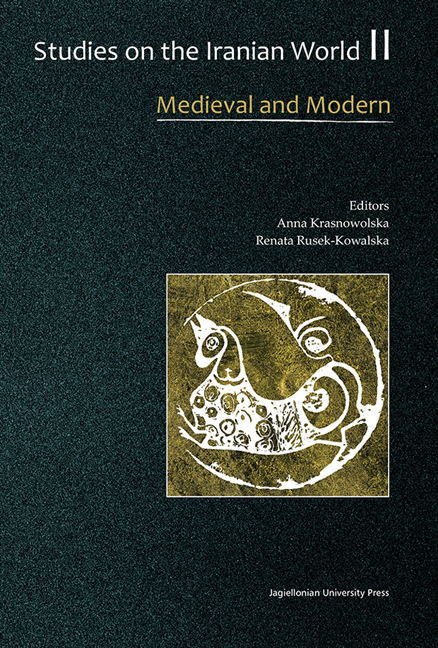Book contents
- Frontmatter
- Contents
- Foreword
- Linguistics
- The Northern-Central Group of the Iranian Central Dialects: an Areal and Diachronic Perspective
- Some Comments on a Parallel Text in Dari, Tojiki and Farsi
- Verbalization of the Universal Human Concept of the Soul in Persian
- The Problem of Subject Clauses versus Complement Clauses in Persian
- Literature
- Religion
- History
- Arts
- Social and Cultural Studies
Verbalization of the Universal Human Concept of the Soul in Persian
from Linguistics
Published online by Cambridge University Press: 12 January 2018
- Frontmatter
- Contents
- Foreword
- Linguistics
- The Northern-Central Group of the Iranian Central Dialects: an Areal and Diachronic Perspective
- Some Comments on a Parallel Text in Dari, Tojiki and Farsi
- Verbalization of the Universal Human Concept of the Soul in Persian
- The Problem of Subject Clauses versus Complement Clauses in Persian
- Literature
- Religion
- History
- Arts
- Social and Cultural Studies
Summary
SUMMARY
The problems concerning terms such as concept, concept sphere and conceptualization are mainly researched within two relatively new fields in linguistics, namely Cognitive Linguistics and Cultural Linguistics. Cognitive Linguistics regards linguistic phenomena as products of human experience and its main focus is on how human beings comprehend, manipulate and metaphorically extend meanings. Cultural Linguistics focuses on the interrelationship between language, culture and conceptualization, taking into account that various cultures provide different perceptions of reality and that languages reflect such variations. This study explores the Persian conceptualisation of the SOUL – one of the universal human concepts – mostly through linguistic and semantic analysis of lexical and phraseological units verbalising this concept in Persian. This article is in line with the research of Anna Wierzbicka who presents a crosslinguistic study comparing universal human concepts such as soul, mind and heart and their embodiment in different languages.
In the contemporary globalised world, the scale of interaction among representatives of different cultures and ethnoses is increasing steadily. This provokes interest from linguists towards language phenomena in the wider extralinguistic context, in particular those bound with inter-lingual communication problems. Undoubtedly, for successful communication today, it is necessary not only to have good command of a certain language, but also to comprehend specific features of world view, national character and the mentality of the people this language is spoken by. Anna Wierzbicka maintains that ‘there is a close link between the life of a society and the lexicon of the language spoken by it. This fact not only applies to material culture but also to people's values, ideals, attitudes, and their world view’ (Wierzbicka 1997, p. 5). Every lingua-culture inherits and transmits historically and culturally-shaped ways of thinking (Wierzbicka 2010, p. 1), which is manifested in the language and various linguistic products of its representatives.
The problems of the human conceptualization of the world have received a lot of attention from scientists in recent years. In Russian and Ukrainian linguistic societies, the main focus is on the study of the so called ‘linguistic picture of the world’, i.e. a system of culturally significant notions and stereotypes reflected in linguistic entities. Furthermore, the number of works devoted to different aspects of this lingua-cultural phenomenon has recently been increasing.
- Type
- Chapter
- Information
- Studies on the Iranian WorldMedieval and Modern, pp. 35 - 44Publisher: Jagiellonian University PressPrint publication year: 2015



